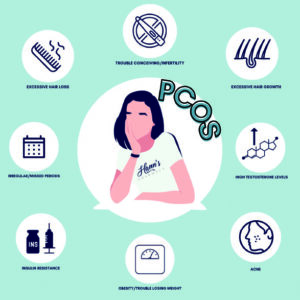Hormones aren’t just a concern for women approaching menopause; hormone issues can affect women at any age. One of the most common yet often misunderstood hormonal disorders among young women is Polycystic Ovary Syndrome, or PCOS. Affecting up to 20% of premenopausal women, PCOS is far more common than many realize and deserves greater attention.
 What Is PCOS?
What Is PCOS?
PCOS isn’t solely about cysts on the ovaries, as the name might suggest. In fact, many women with PCOS don’t have ovarian cysts at all, and not all women with ovarian cysts have PCOS. The name can be misleading because the true cause of PCOS isn’t in the ovaries—it’s an endocrine disorder linked to insulin resistance, not just a gynecological issue.
The Many Faces of PCOS
PCOS presents with a range of symptoms, and no two women experience it exactly the same way. Common symptoms include:
Irregular or heavy periods
Weight gain or trouble losing weight
Acne and unwanted hair growth
Cravings for sugary foods and intense PMS
This variability is one reason PCOS often goes undiagnosed. Some women have regular cycles and maintain a healthy weight, while others experience more intense symptoms. The differences can make it hard for both patients and doctors to spot the condition.
The Role of Insulin Resistance
The main culprit behind PCOS is insulin resistance. When your body becomes resistant to insulin, it produces more to compensate, which disrupts other hormones and raises testosterone levels. This hormonal imbalance can lead to skin issues, weight gain, and even fertility problems. Left untreated, insulin resistance can increase the risk of diabetes, heart disease, and some cancers, making early intervention essential.
Why Early Diagnosis Matters
Getting an early diagnosis of PCOS is crucial for managing symptoms and preventing long-term health risks. Many young women focus on visible symptoms—like acne or irregular cycles—without considering the underlying health concerns. However, research shows that untreated PCOS can lead to serious issues, such as a five-fold increase in breast cancer risk due to low levels of progesterone, an important hormone for reproductive health.
Diagnosing PCOS
Diagnosing PCOS can be straightforward with a few blood tests to assess hormone levels, combined with a review of symptoms and possibly an ultrasound. Once confirmed, treatment can be tailored to each woman’s needs.
Key Elements
of PCOS Treatment
Treating PCOS involves a holistic approach that targets both the root causes and specific symptoms. Here’s a breakdown of the main goals:
Address Insulin Resistance: Insulin-sensitizing medications can help lower insulin levels and reduce resistance, addressing a key cause of hormonal imbalances.
Support Progesterone Levels:
Women with PCOS often have low progesterone, which can lead to heavy bleeding and increase cancer risks. Natural progesterone can help regulate menstrual cycles, ease PMS, and support long-term health.
Optimize Thyroid Health:
Many women with PCOS experience thyroid resistance, impacting energy and metabolism. Natural thyroid supplements can improve energy and support weight management.
Manage Skin and Hair Issues:
Elevated testosterone can lead to acne and unwanted hair growth. Certain medications can reduce these effects, helping women feel more comfortable in their skin.
Lifestyle Adjustments:
Diet and Exercise Matter
While medications are essential, lifestyle changes play a vital role in managing PCOS. A balanced diet focused on whole foods and reduced refined carbs can naturally lower insulin levels. Regular exercise, especially resistance training and aerobic workouts, can improve insulin sensitivity and support healthy weight. These lifestyle changes are foundational for women with PCOS and can greatly enhance overall well-being.
Closing the Awareness Gap
Despite being so common, PCOS remains underdiagnosed and untreated. Women with symptoms like irregular periods or acne may be told it’s “normal” or “nothing serious,” but these signs deserve attention. Early diagnosis and intervention can reduce long-term risks, including diabetes and heart disease.
With so much information online, many women may self-diagnose PCOS after researching their symptoms. While online resources can be helpful, a formal diagnosis from a healthcare provider is essential for creating a tailored treatment plan. Women need to feel empowered to ask questions and seek testing if they suspect PCOS might be affecting their health.
Looking Forward:
A Brighter Future for Women with PCOS
Greater awareness is the first step in better managing PCOS. As more women and healthcare providers recognize its signs, early diagnosis and treatment can become more common. This shift could significantly reduce health risks associated with PCOS and improve quality of life.
PCOS isn’t just about managing symptoms like acne or irregular cycles—it’s about safeguarding long-term health. Early intervention and a holistic approach, including medication, hormone support, diet, and exercise, can make a world of difference.
Although PCOS is a lifelong condition, it doesn’t have to define your life. With the right care and lifestyle adjustments, women with PCOS can lead healthy, fulfilling lives.
If you’re experiencing symptoms that could be related to PCOS—such as irregular periods, PMS, weight gain, or difficulty conceiving—reach out to a healthcare provider versed in the disorder. And if you’ve been diagnosed, remember: you’re not alone. Millions of women share your journey, and with the right support, PCOS can be managed effectively.
Optimized Wellness and Hormones
863-899-2404
info@optimizedwellness.net
optimizedwellness.net
 Central Florida Health and Wellness Magazine Health and Wellness Articles of the Villages
Central Florida Health and Wellness Magazine Health and Wellness Articles of the Villages



